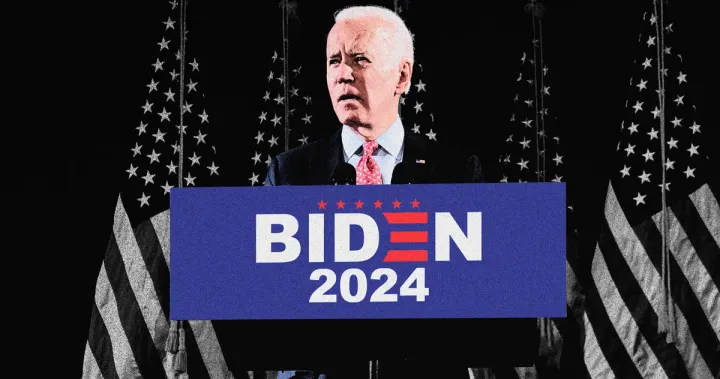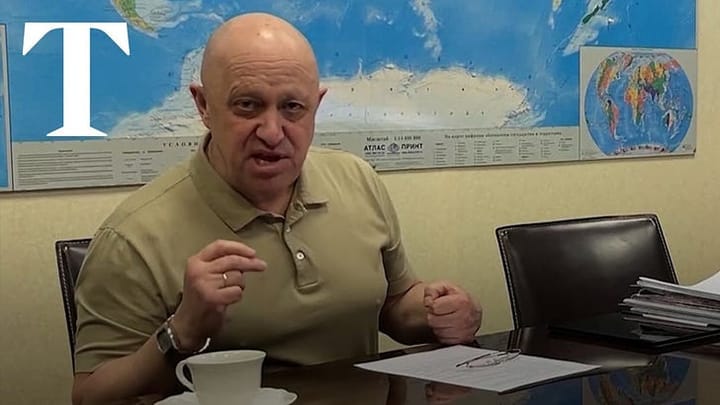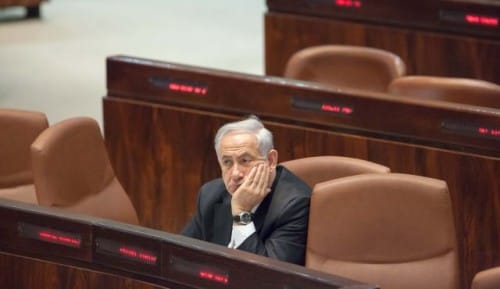The War of Pain
Everyone is at fault. Everything is terrible.

Lately, when reading the news from the Middle East, I’m reminded of this dialogue from Blade Runner, the classic movie with Han Bladerunner.
You’re in a desert walking along in the sand when all of the sudden you look down, and you see a tortoise, it’s crawling toward you. You reach down, you flip the tortoise over on its back. The tortoise lays on its back, its belly baking in the hot sun, beating its legs trying to turn itself over, but it can’t, not without your help. But you’re not helping. Why is that?
You’re not helping. No one is helping.
The dialogue surrounding the Gaza War, like everything else in our terrible era, swiftly devolved into dueling realities that cannot tolerate each other.
On one side, Hamas schemed for years to carry off a brutal terrorist attack that killed over a thousand people in their homes, or in a concert field, for the crime of being Jewish. They then, like medieval reavers, after finishing the killing, raping, pillaging, and looting, carried off hundreds of captives to their lair. Israel, stunned, wounded, fought back like you would. Like anyone would. And now they’re being attacked for it. People are tearing down posters of kidnapped hostages or slapping “OCCUPIER” stickers on them. People are charging into airports demanding the staff produce the Jews for them to beat. What can be done, how do you negotiate with this?
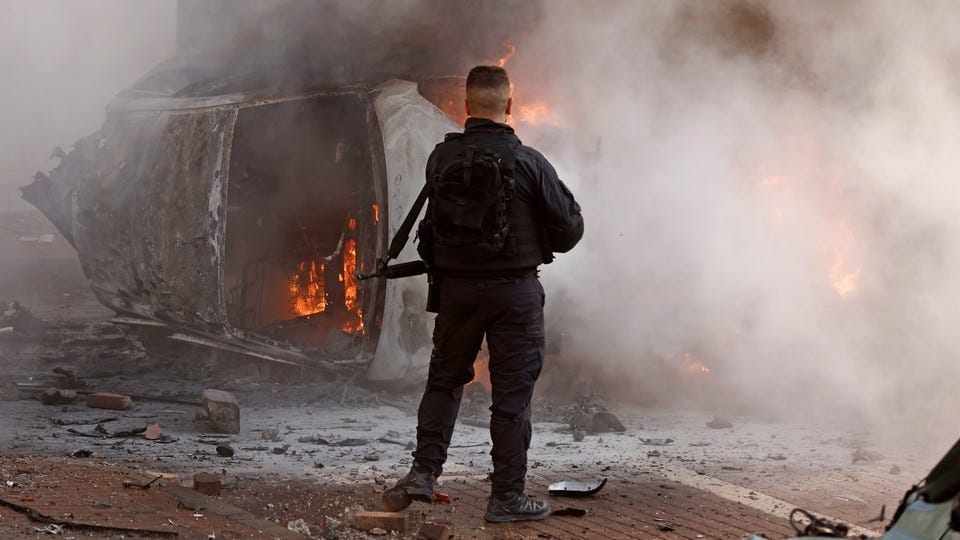
On the other side, Israel has been, for the past month, constantly bombing a helpless open-air prison, simply because they’re Palestinians. They don’t see them as human beings, they’ve said as much publicly, repeatedly. Thousands of people are dying. Thousands of children are dying. Hospitals are being bombed. Refugee camps are being bombed. America is handing them the bombs that are being dropped. Israel commits war crimes constantly - one Palestinian NGO estimated that a child in Gaza is now being killed every fifteen minutes. What can be done, how do you negotiate with this?
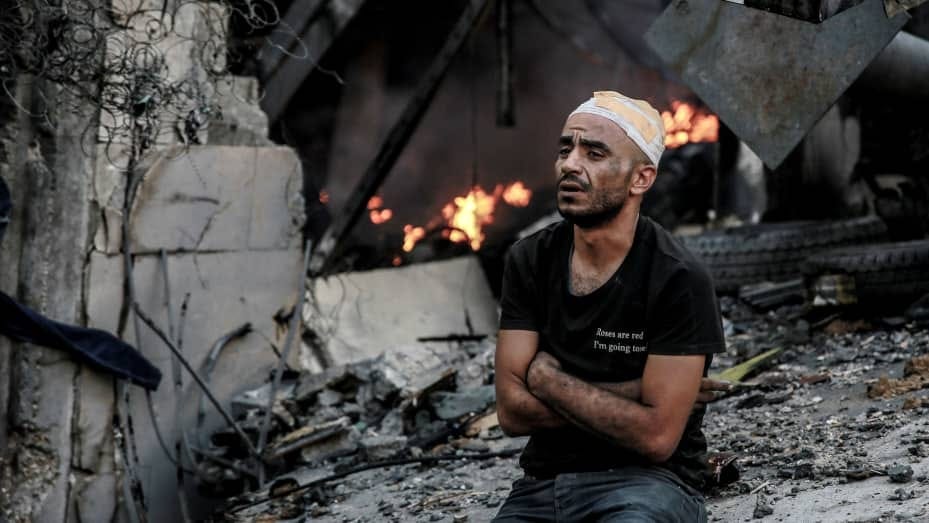
The absolute hell that we are in is that both of those perspectives are absolutely, 100% correct. Hamas did storm into Israel and commit an act of terror worthy of the Mongol Horde. Israel is making a mockery of the Law of Armed Conflict on a minute-by-minute basis. People around the world are marching in the streets, demanding the bombing stop. Among them are people screaming “kill the Jews”.
The problem is war.
Chris Hedges is a problematic writer on the very best of days, but still occasionally a brilliant one. His best work, by far, is his first: War Is A Force That Gives Us Meaning. Written in the immediate aftermath of 9/11, Hedges draws on his experience as a war correspondent in the Balkans to describe just how seductive and evil the symphony of violence that modern warfare is can become. Not just for the soldiers and others directly in its path, but in the societies corrupted by the demands of war’s steady drumbeat. The key lesson, in this case, is war’s essential simplification.
We define ourselves. All other definitions do not count.
War makes the world understandable, a black and white tableau of them and us. It suspends thought, especially self-critical thought. All bow before the supreme effort. We are one. Most of us willingly accept war as long as we can fold it into a belief system that paints the ensuing suffering as necessary for a higher good, for human beings seek not only happiness but also meaning. And tragically war is sometimes the most powerful way in human society to achieve meaning.
But war is a god, as the ancient Greeks and Romans knew, and its worship demands human sacrifice.
There is no room in war for nuance or dialogue. War is a cacophony of loud slogans and obvious demands, of the just who must regretfully slay the unrighteous. To quote Hedges again:
The conflict between the Israelis and the Palestinians has left each side embracing death. They each believe that they are the only real victims. There is a celebration of suicidal martyrdom and justification of the tit-for-tat killing of noncombatants.
Twenty years after he wrote that paragraph, it has been proven beyond anyone’s doubt. Even continents away, there is a demand that each side acknowledge the others’ victimhood - that there can be no dialogue without first surrendering the field of debate and admitting “your side” are the inhuman bastards who did this to innocent children.
The fact that children on both sides are dead is of no consequence. Pain is at war with pain, loss in a never-ending battle with loss. There can be no resolution save death.
Thus, Israel’s chief diplomat globally, the ambassador to the UN, Gilad Erdan, showed up this week for a debate about “our side” and “your side” with the ultimate accessory.
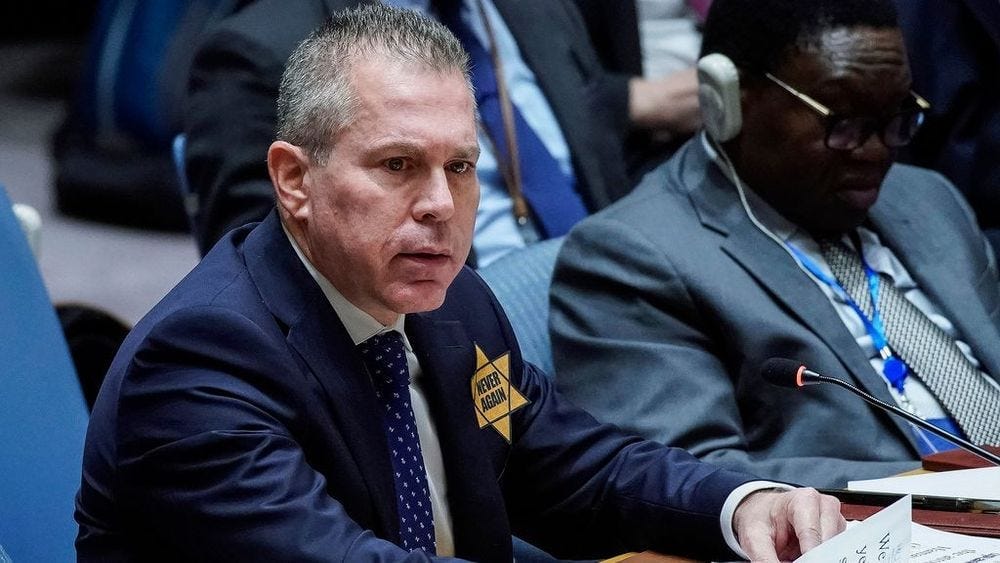
To Israeli society’s credit, this was universally seen as “too much” — although how a ‘diplomat’ who for the past month has been raving barely coherently about “Nazi ISIS Hamas Iran” is now seen as too much seems a bit, well, too much. It’s all too much, all of it.
The real danger, as I write this, is that there is no way for either side to climb down from the cliff’s edge. War has taken on its own logic, and as the death toll rises on every side, no one will take the essential leap of faith - of seeing one’s counterpart as a human being that should not be killed today - that making peace requires.
And on both sides there will be cheering, and screaming, and shrieking, and demanding that their pain be recognized, acknowledged, before they even consider the existence of the others’ pain.
It is a war of pain. There can be no victor. There will only be the dead, and those who survive.
Reading this, you may ask yourself - what can I do?
It may surprise you that peace in the Middle East is an elusive concept on the best of days. But the most important thing you can do is simply to listen, and try to understand perspectives with which you are unfamiliar.
If you oppose the bombing of Gaza, read this brief article from a noted historian of how the Hamas attack has wounded Israeli society.
If you oppose the Hamas terror attack, read this brief article of a writer trapped with his family in the midst of an unending bombing campaign of terror.
Try to understand that no matter how just one side may seem - there is an equal measure of justice on “the other” side. And only then can peace come.
